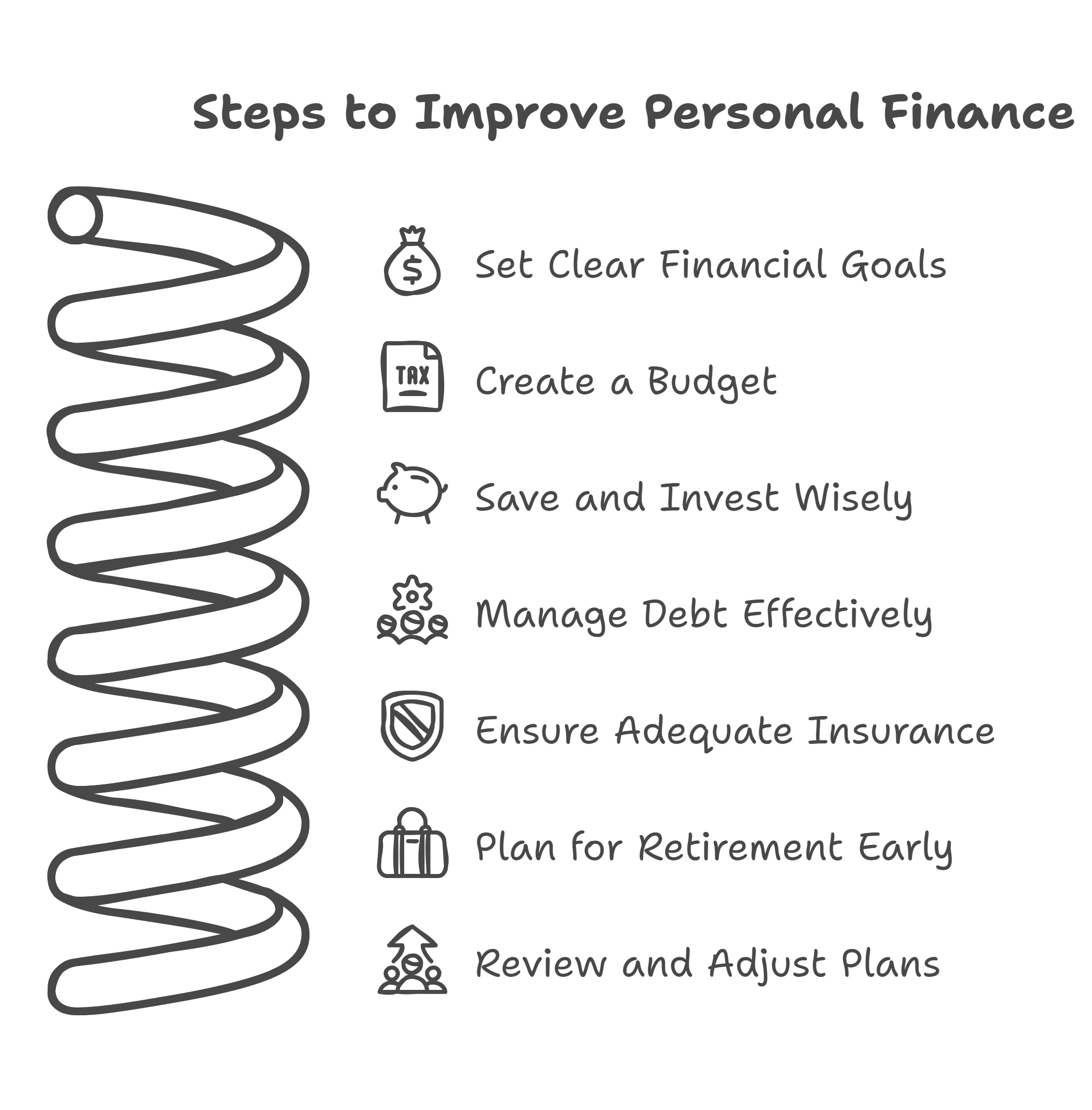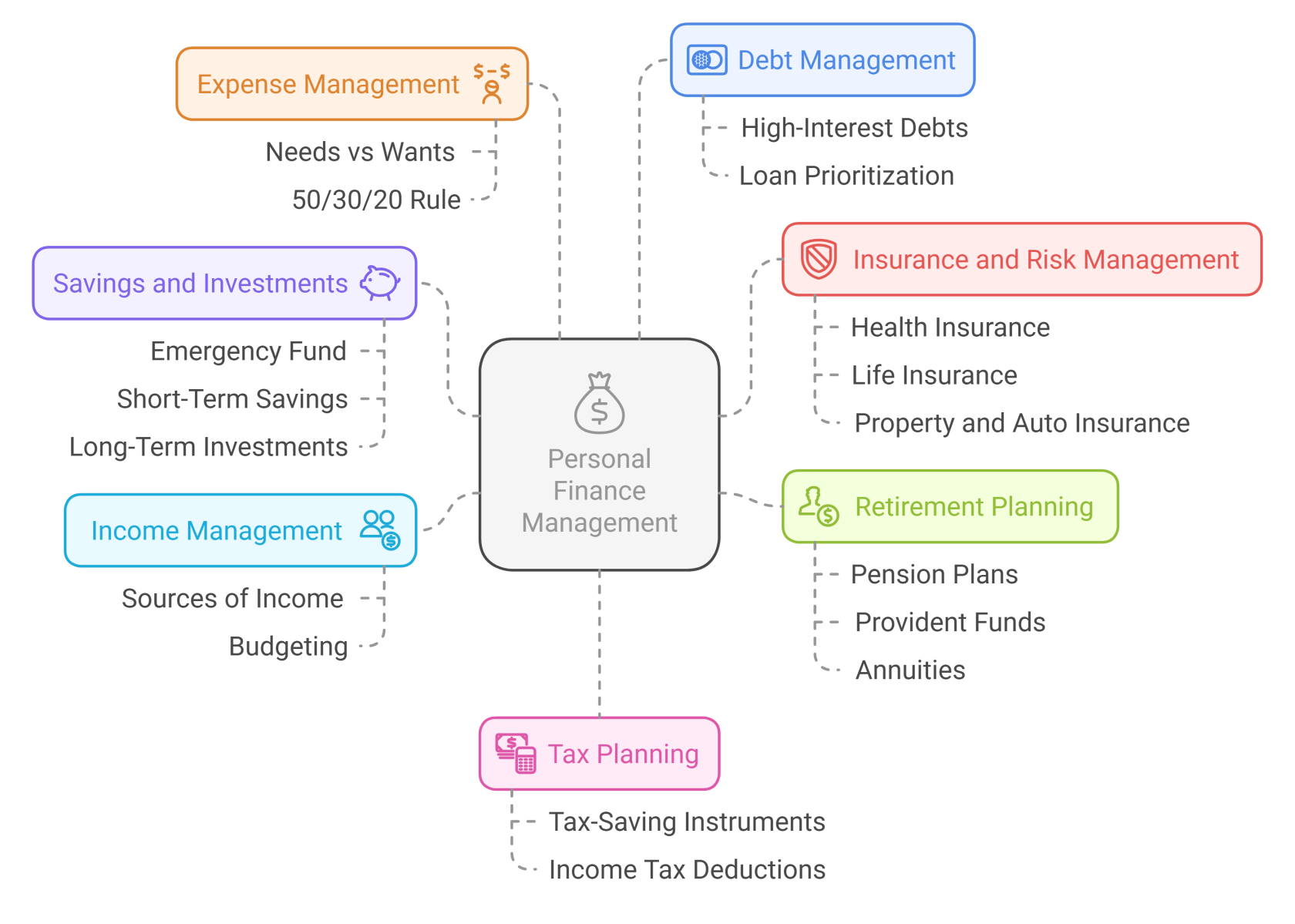Personal Finance
What is Personal Finance?
Personal finance refers to the management of an individual's financial activities, including earning, saving, investing, and spending money. It involves planning for financial security, wealth accumulation, and achieving financial goals through informed decision-making.
Importance of Personal Finance
Understanding personal finance is crucial for:
- Achieving Financial Goals: Helps in planning for short-term and long-term financial needs such as buying a house, education, or retirement.
- Managing Debt: Ensures responsible borrowing and timely repayment to avoid financial distress.
- Wealth Creation: Enables effective investment in different financial instruments to build wealth over time.
- Emergency Preparedness: Provides financial security during unforeseen circumstances like medical emergencies or job loss.
- Tax Planning: Optimizes tax liabilities through efficient use of tax-saving instruments.
Key Components of Personal Finance
-
Income Management
- Sources of income include salary, business earnings, rental income, and investments.
- Creating a budget to track income and expenses ensures financial discipline.
-
Expense Management
- Categorizing expenses into needs (essentials) and wants (luxuries) helps in controlling unnecessary spending.
- Following the 50/30/20 budgeting rule:
- 50% for necessities
- 30% for wants
- 20% for savings and investments
-
Savings and Investments
- Emergency Fund: Maintaining 3-6 months' worth of expenses in a liquid account.
- Short-Term Savings: For immediate needs such as vacations or gadget purchases.
- Long-Term Investments: Fixed deposits, mutual funds, stocks, bonds, real estate, and retirement funds.
- Diversification helps in risk management.
-
Debt Management
- Avoiding high-interest debts like credit card balances.
- Prioritizing loan repayments based on interest rates (e.g., clearing high-interest loans first).
- Using debt responsibly for asset building (e.g., home loans, education loans).
-
Insurance and Risk Management
- Health Insurance: Covers medical emergencies and reduces financial burden.
- Life Insurance: Ensures family financial security in case of an untimely demise.
- Property and Auto Insurance: Protects against financial losses due to theft, accidents, or natural calamities.
-
Retirement Planning
- Planning for post-retirement income through pension plans, provident funds, and annuities.
- Starting early allows the benefit of compounding to build a significant retirement corpus.
-
Tax Planning
- Utilizing tax-saving instruments like Public Provident Fund (PPF), National Pension Scheme (NPS), and tax-saving fixed deposits.
- Maximizing deductions under Income Tax laws to reduce taxable income.
Steps to Improve Personal Finance
- Set Clear Financial Goals: Define short-term and long-term financial objectives.
- Create a Budget: Track income, expenses, and savings regularly.
- Save and Invest Wisely: Follow a diversified investment strategy.
- Manage Debt Effectively: Avoid unnecessary debt and pay off loans strategically.
- Ensure Adequate Insurance: Protect against unforeseen financial risks.
- Plan for Retirement Early: Start investing in retirement funds as soon as possible.
-
Review and Adjust Plans: Regularly assess financial health and make necessary changes.
 Understanding and managing personal finance is essential for financial security, wealth creation, and achieving life goals. By following disciplined financial practices and making informed decisions, individuals can ensure financial stability and a stress-free future.
Understanding and managing personal finance is essential for financial security, wealth creation, and achieving life goals. By following disciplined financial practices and making informed decisions, individuals can ensure financial stability and a stress-free future.


No Comments